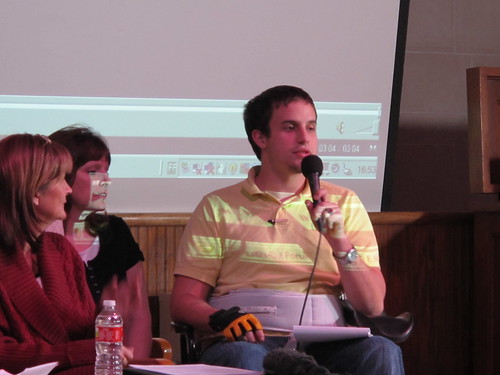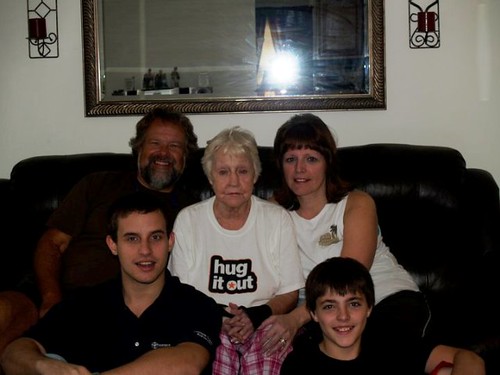At Gulf oil disaster forum, health problems on dramatic display
When I first saw Paul Doomm at a health forum of Gulf residents in New Orleans, he was flat on his back, gasping for air from a seizure that had suddenly overcome him. His mother, father and 11-year old brother were at his side consoling him in the meeting hall of the First Unitarian Church, trying to keep his head from banging against the hard floor as his body went into convulsions.
His parents, Paul and Kathy Doomm, a registered nurse, remained calm as they attended to their son. They said the seizures happened several times a day. They had been to 14 hospitals, Kathy explained, but no one could tell them what was causing his seizures. But they wondered about the oil and dispersant polluted water that washed up on their beaches, beaches they avoided but Paul did not.
I felt helpless watching him as he writhed on the floor while his family attended to him with a bag full of medicines and a head rest. They had been through this drill many times before, and they assured everyone he would be fine. As more people gathered around, Paul’s seizure began to pass and his family helped him back into his wheelchair. It was a daily ritual, they said. It had already happened during the 200-mile drive from their home in Navarre Beach, FL. They had come all this way hoping to get answers about what was causing their son’s uncontrollable seizures. They would go anywhere to get them.
But this was not the last time we would witness Paul’s seizures that day.
Watch this video of Paul Doomm's speech during the Truthout for the Gulf health forum in New Orleans. Video shot and provided courtesy of Jerry Cope and Guardians of the Gulf.
Paul watched from his wheelchair as Wilma Subra of the Louisiana Environmental Action Network (LEAN) described her environmental human health testing in the Gulf so far. “The environmental impacts of this disaster will last for generations,” she warned the audience of about 200 concerned citizens, some of whom stepped forward to discuss their own health issues (watch video of Wilma Subra's comments and the audience questions here courtesy of Fluxview, USA).
After a break from Wilma’s presentation, Paul joined a panel of Gulf residents on stage to address the crowd. Sitting in his wheelchair, Paul took the microphone and calmly described the onslaught of health problems that began last summer. He admitted he been swimming in the Gulf waters near Pensacola and eating seafood against the advice of his parents, who were worried about the oil that invaded their beaches and coastlines. But Paul explained he was healthy and planning to join the Marine Corps. He wasn’t worried. But now he wishes he had heeded his parent’s advice.

Paul Doomm at Truthout for the Gulf in New Orleans Photo by Rocky Kistner/NRDC
Later last summer, Paul said he developed severe headaches and dizziness, and he checked into his local hospital to find out what was happening. Initial tests came up negative, he said, but he continued to experience severe headaches and dizziness. His condition worsened.
Then the day before Thanksgiving, Paul said he felt dizziness and numbness in his arm, then passed out. The next thing he knew he woke up in the hospital paralyzed on the left side of his body. Doctors at first thought he had suffered a stroke, but tests ruled that out, Paul told the audience. Extensive hospital tests revealed small lesions in his brain, he said, but doctors couldn’t explain what caused them. Since then, Paul said he had been to 14 hospitals trying to determine the cause of his almost daily seizures. He still doesn’t have answers, but he wanted others to hear his story. And he prayed the oil wasn't the cause.
Like the rest of the audience, I was spellbound by his speech. It seemed an impossible story. How could there be so few answers for a formerly healthy youth, someone who had signed up to join the Marine Corps?

Audience member talks about her health problems Photo by Rocky Kistner/NRDC
As the next speaker address the audience, I noticed Paul beginning to slump in his wheelchair. His concerned mother was behind him massaging his neck. Paul was slipping into another seizure. Several of us from the audience approached the stage and helped carry Paul down from the stage, struggling to keep the study 22-year old upright in his wheelchair. His legs become locked and caught in the wheels. We turned the wheelchair around and backed it out of the suddenly quiet assembly room into a back hall of the church. As we laid him on the floor, his body jerked in uncontrollable convulsions. We tried to hold his legs while his parents and others held onto his head and upper body, occasionally turning him on his side to keep him from choking.
After 20 minutes it was apparent Paul would need medical assistance. Someone called an ambulance and paramedics soon arrived. They inserted IVs in his arms and we lifted him onto a stretcher for a quick ambulance ride to the nearby Ochsner Baptist Medical Center.
But Paul’s ordeal unfortunately did not end there. His mother told me later she believed Paul did not receive proper treatment at the hospital, and that a doctor asked her if they had been conducting “an exorcism” in the church. Paul confirmed he heard it too. Flabbergasted by that comment, the family refused to have Paul admitted and drove 200 miles back to their home in Florida.
Paul says he stayed in bed for several days after his trip to New Orleans, with numbness still in his leg. He’s still searching for answers. “I didn’t expect to go to New Orleans and be the center of attention,” Paul says. “I wanted to get the word out there about what has happened to me. I’ve seen every kind of specialist there is and no one has answers. It’s been a long journey.”

Paul Doomm (l) and family in happier times. Photo courtesy of Paul Doomm
Marylee Orr, executive director of LEAN, says there are many other Gulf residents searching tfor answer too since the oil disaster. “A lot of people have come to us with symptoms similar to Paul’s, headaches, dizziness, blood in their stools, nosebleeds and neurological problems. There is a haunting and overwhelming need out there for more tests. But many people don’t have the money to get them done.”
People across the Gulf complain little is being done to address their immediate health problems, and they worry BP will never cover their medical expenses. But if history of the Exxon Valdez spill is any example, it could take years for us to understand the human health toll from this oil disaster. We all hope that more people don’t end up taking the long journey that Paul has just begun.
